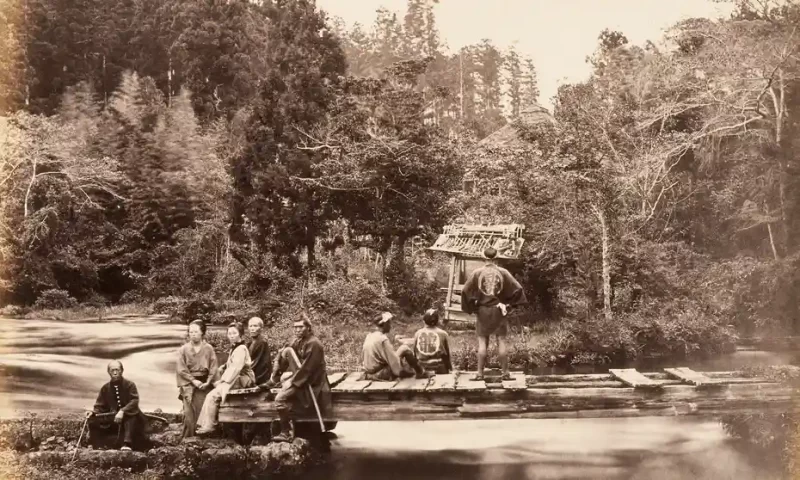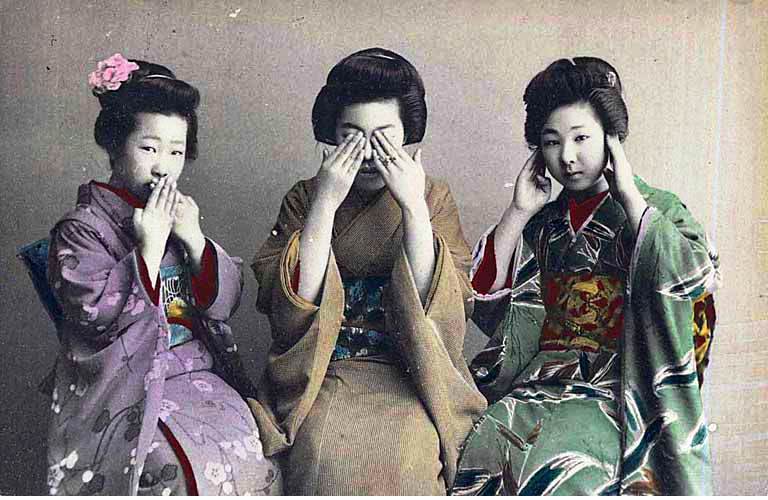To insist on arbitrary action because you’re not reconciled to your fate is something that men should be most wary of. If people let their minds go off according to their individual likes and dislikes, confusion will grow day by day. This, it seems, is the reason for working on soundness of mind by making peace with destiny in the present. –Yamaga Soko
You are where you are meant to be, as you are, in this moment. Now, if you are hurting or in a place of difficulty, this can be hard to accept. You want the pain and problems to go away. But that isn’t making peace with your current destiny. Only once you make peace, accept the present moment as it is, can you move beyond it. Only then can you grow. In my mid-twenties, I had a crisis of faith. My fundamentalist view of Christianity broke down, and I had a falling out with my first love. Even now, two decades later, I still miss her, but the events changed me for the better. I remember, even now, very little of what happened. I remember only a few key points and the moment I awoke thanks to finding a book about Zen. Once you are out of the valley can you see the distance you’ve covered and how you’ve changed in the process. In the moment, the destiny of the present, you can’t see how you are changing. You can direct some of that change toward the good you’d prefer to have, but you will not be able to see the distance until you look back, sometimes years later.
When you look back, you might feel regret, as I do. Remind yourself that you can only feel regret and consider all the better ways you could’ve worked within that present because you’ve changed since that event. At the time, you didn’t have the tools and ways of thinking that you do now. And you only have those tools and ways of thinking because of that event. In your past, you did the best you could’ve done with the tools you had at the time. The tools may have been inadequate in retrospect. You, however, have less control over events than any of us like to believe. We don’t like to think about the idea of fate. We like to think we have free will and control over our behavior. This belief makes us flail about with the arbitrary action and following the whims of our likes and dislikes as Yamaga Soko writes. We rail and fight and achieve little for the effort. We achieve even less with regret and thinking of what might have been. After we accept we have limited control can we leverage what control we do have to best effect. We can direct our energy toward that action and accept the rest as outside our ability.
Fate is little more than the circumstances that influence your ability to act: your culture, your parents, your genetics, your environment, the timing of events, and other factors. Now you may say that you can change your environment or culture or leave your parents, but your ability to act accordingly is a product of your fate. Nomads are fated to be nomads. The rooted are fated to be rooted. At least within the present. Your ability to choose to be a nomad or choose where to be rooted result from a long chain of inputs, some of which you have control over, most of which you had no control over. You can only travel because you are born in a time when technology enables travel. You can remain rooted because of the community and factors that enable you to be rooted. Both of these fates are equally valid. If everyone was nomadic, civilization wouldn’t have stability. If everyone was rooted, development would not happen. Fate also changes over time. A nomad can be fated to be rooted. A rooted person can be destined to travel. Death destines both.
How you are now sets the position you are destined to be in later. You cannot foresee this position. I couldn’t foresee just how different a person I would become after those events in my mid-twenties. I can’t foresee how different a person I will be twenty years from now. My current fate may change. Or it may not. Only in retrospect can you see your fate.
An aside: despite the FOMO and pressure to travel and wander placed on us through culture, being rooted isn’t a bad thing at all. In fact, it’s noble to stay in one place and build a community rather than chase jobs. Nomadic living isn’t a bad lifestyle at all either, but not everyone can be nor should be, no matter the what the job market and social media may try to dictate.
While there are many different inputs to your fate Yamaga Soko reduces fate to three elements:
Generally speaking, for someone to become established in the world is firstly a matter of timing; secondly a matter of being born in an outstanding family; and thirdly a matter of the individual having a temperament suitable to the times. Only when these three conditions are fulfilled can your time come. None of them can be created by yourself; it can only happen naturally.
He also writes:
There are also those whose time never comes because of geographical isolation and lack of cooperating, yet cannot accept a simple life.
If you consider this discouraging, you are fated to think so because of your previous circumstances. If you read between Yamaga Soko’s lines, however, you can see room for volition. You can develop your temperament and be ready for the timing of your destiny. You can build an outstanding family of your own. Fate doesn’t preclude choice, but neither do you have the absolute freedom our culture makes people believe. You are bound by your genetics, inborn temperament, culture, and other circumstances. Think of fate as a bracket. It determines your lowest potential and your highest potential. You choose where you exist within that bracket. This destined bracket makes comparing yourself to others a useless exercise. Their fate isn’t yours; their bracket differs. Rather, compare yourself to yourself. Determine where you sit in your bracket and where you want to be within your bracket. Your maximum potential will remain mostly a mystery. You can, however, sense your lowest bracket based on your temperament and knowledge of your weaknesses. This is a fate you can reach based on your poor choices.
So, when it comes to fate, you are where you are meant to be as you are meant to be within this moment. Accept the factors you cannot change and focus your effort on what you can improve. Envision where you want to be in your bracket, determine what steps you need to take to move there, and take that first step. It can be sleeping better. It can be exercising. It can be writing. Make the first small step that’s within your power and keep making those small steps. Expect to experience events that will change you. These are your fate and unavoidable. You can direct some of your change. Aim toward your higher bracket. Train what is within your control.
And what lies within your control?
Your thoughts, emotions, and actions.
Everything else–politics, economics, weather, illness, the actions of other people, to name a few–sits beyond your control. Accept them as they are now and do what you can to influence them for the better, knowing you can only nudge these events at the most. Do not waste your life trying to control what you cannot. Fate will have its course.





Have you found any similarities between a lifestyle of Zen and Stoicism? There seems to be a central theme of mindfulness.
And to use a term from either Brene Brown or dialectical behavior therapy, there seems to be a theme of radical acceptance.
Zen tends to be more analytical than Stoicism. Zen contains the idea of karma (cause and effect functioning within a context which is also determined by cause and effect), which many people misunderstand. Stoicism focuses more on developing an internal locus of control without concerning itself with the interplay of cause of effect. You are right, both center on mindfulness and acceptance. Both also suffer from how people mistake acceptance for resignation. They are quite different concepts. Neither Zen nor Stoicism advocate for resignation. Instead, they teach acceptance of your limitations (you can only control your thoughts, emotions. and actions) and your environment (cultural and physical) are necessary for contentment and the ability to maximize your agency within those limitations.
The realities we each construct for ourselves are confined to the interpretations made in that space between our ears. I don’t think it’s all that unusual for reasonably intelligent people in their twenties, thrust into some new and cognitively dissonant environment, to experience the kind of shift you describe. For better or for worse, it’s a loss of childhood’s beliefs and a replacement with new faiths. The universe shrugs.
Yamaga was appealing to the same arguments for the beneficial result of social order in one’s acceptance of station as had Plato in The Republic. Shi-nō-kō-shō (leader, producer, creator, trader) was a hereditary system of passed knowledge such that it was forbidden even to marry between castes. In the West, I think the printing press first threw a wrench into that idea. Knowledge is a great equalizer, and especially when paired with passion.
Regardless, and while I suspect that “free-will” is an illusion, if “success” in life is merely satisfaction in some form or another, then there are many ways it can be achieved. So where the two don’t meet could be seen merely as a mismatch between internal and external realities.
A shift in 20s? I’m over 60 though and still changing my luck. Explain that.
The universe isn’t a living thing, it doesn’t even shrug. But man learns how the universe works and makes amazing things. You are communicating on the internet because of hundreds of thousands who made things that didn’t exist without the mind of man, who did not resign themselves to a fate of being a herd of hunter-gatherer primate with rocks for tools in the plains of west Africa as all humans were more than a hundred thousand years ago. We’ve had ancestors that changed mankind’s luck.
Don’t accept any fate. Deal with it and conquer it.
It appears we are using two different definitions of fate.
1. How do you define determinism/fate?
2. What are your thoughts of people who are born with disabilities which limit their ability to achieve?
3. How do you define luck? Do you consider the world a set of probabilities we can influence?
Your questions didn’t have a reply button, so I guess my reply will be above your questions.
1. How do you define determinism/fate?
A. The belief that all future events, including our personal future, are entirely due to forces external to our will. I reject this, the exercise of our will through actions can alter our future. Even physics teaches us the future isn’t knowable and set, even a single particle interacting with another gives rise to new possible futures but it is not knowable which one, just that some will be more likely than others.
2. What are your thoughts of people born with disabilities which limit their ability to achieve.
A. I gave as example my disability of extremely poor eyesight, dealt with by solution from the mind of man. Are there people so disabled they can’t affect their future by any means? Yes, but that is not true of most people, and our civilization is making cures, prosthesis, solutions and opportunities for more and more disabled people. Our civilization refuses to accept that a person born disabled enough should not have opportunity. A man who can’t walk can ride to work and ride into a building to a desk in this 21st century and do a job identical to mine, and I see such people on the train to work. I saw in the news there is a licensed pilot and that woman has no arms. She’s giving fate the middle… toe.
3. How do you define luck? Do you consider the world a set of probabilities we can influence?
I was actually mocking the belief in luck in a roundabout way, saying people can make their own luck. Yes, we can influence probabilities, even in our favor. Again I have to bring up our best model of reality in physics, quantum field theory, says any interaction of even two particles creates a future of new probabilities, none of them absolute but some of them more likely. We can change our future, and the future is not set. Not for a particle, not for a person.
Saying we only will experience a certain fate already determined is a defeatist attitude.
I tweaked a setting that was a bit too restrictive. Comments should nest a little deeper now.
Thank you for clarifying your perspective! I should’ve asked these questions from the start. Apologies!
The idea of determinism, the free-will illusion, isn’t a comfortable one. I don’t like the idea either, but everyone is bound (or bracketed) by the circumstances of their birth. We don’t choose our genetics, time period, parents, and (as increasingly being shown by research) temperament. And these determine how we conduct ourselves. Part of the mismatch between internal and external realities is a function of this determinism. This doesn’t remove our agency in the matter, but we cannot exert that agency without first recognizing our limitations and the mismatch you mention. But then, modern society likes to deny the reality of external limitations, exemplified by ideas like the endless economic growth model or the denial of the reality of “fate,” or the determinism of how the universe functions. But then, that denial is an outcome of that determinism too.
Right, the descendants of primates from the plains of west africa can’t walk on the moon, can’t see to the ends of the known universe, can’t communicate with others on the far side of the world nearly instantly, can’t have a trillion calculations about the structure of the interior atom done in a second, can’t fly, can’t go six miles under the sea, can’t keep people from getting smallpox..,.
And limited by genetics. Genetics says I have very bad eyesight and could never read a book or see someone far away. But optics made by the mind of man let me do all those things and even drive a car safely.
No, you’re wrong and limit yourself. An excuse is a lie wrapped in the skins of laziness.
An education in a “hard” science left me suspect of the place of “free will”. Among peers, however, it remains an admittedly contentious issue. Regardless, I consider myself rather an existentialist as there doesn’t seem to be much point to assuming some fixed, if nevertheless unknowable destiny. Ralph, I suspect, has misinterpreted my response.
The forces applied by one’s physical condition are, however, fairly apparent… even King Henry VIII had no possibility of experiencing the kind of wealth or knowledge available to the average citizen of any present-day, First-World nation. Regardless, he may very well have been quite satisfied with his life. Today, birthright determines much of one’s future potential, the motive for much of my work in Southeast Asia in the early 2000s. Still, I saw some genuine smiling faces in places I would never have suspected. Add in genetics, nutrition, education, indoctrination…
Whether a person has the innate disposition to utilize whatever resources are at one’s disposal is perhaps the more contentious issue. To what extent nature and the laws-of-physics determine our abilities to respond?… of course, my suspicion is that we don’t really have any choice in the matter. But natural (and social) selection would likely weed out those with brains hardwired in ways that discourage attempting beneficial change. So an internal reality firmly rooted in the perception that we can alter the universe arises as a statistical advantage for those with the trait.
Fate doesn’t exist. People with nothing can develop themselves and make their own luck. Laziness, bad mindset and defeatist attitudes certainly exist though.
My father was born into poverty and hunger as the Great Depression lingered in his area into the 1940s. But he took an apprenticeship and worked very hard and so as adult became well off middle class owning home and able to leave good pension fund and savings for my mother after he died,. Growing up we children lacked for nothing thanks to his efforts for which I’m very grateful.
You can break out of the bracket of your fate. Limits are barriers you built up inside your mind to imprison yourself. A person “resigned to their fate” is their own worst enemy.
what nonsense, I’ve changed my luck several times in a major way. That takes thought, education, effort, and work.
This article reads like the mindset of a lazy loser who want excuses to give up.
The fact you changed your luck several times is a factor of fate: being born with the ability to think, work, and apply effort and having access to education. Some people are born into conditions that limit these abilities. Determinism influences everyone whether they are aware of it or not. As I stated within the essay, you must work within the bracket of your fate, as you have. This isn’t giving up; it’s being realistic.